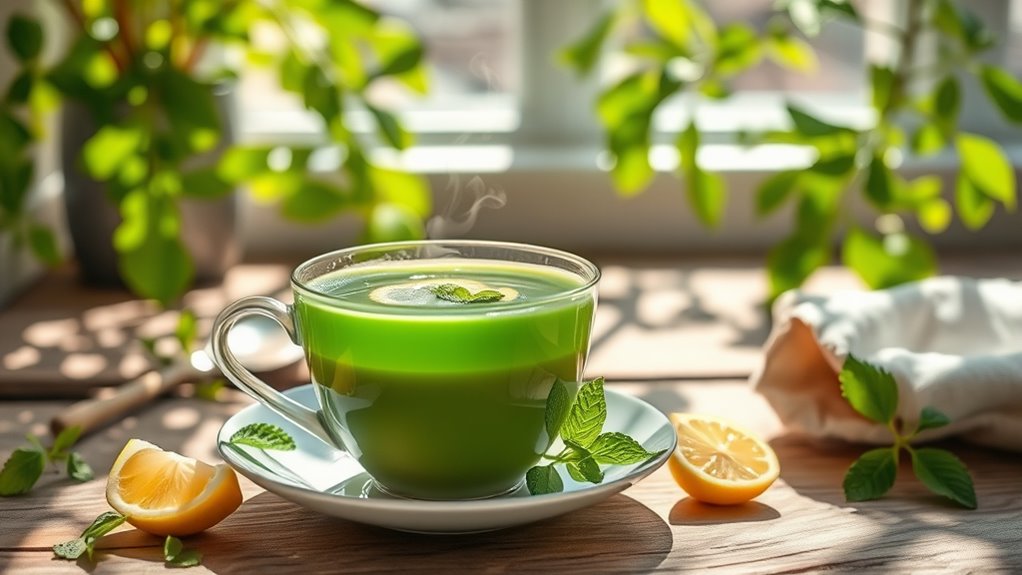Natural Trick to Help Your Digestion After a Heavy Meal
Did you know that the right combination of herbal teas can greatly enhance your digestive process after a heavy meal? Incorporating soothing options like peppermint or ginger can provide immediate relief. Along with herbal remedies, staying properly hydrated plays an essential role in breaking down food and absorbing nutrients efficiently. Curious about other natural methods to support your digestion and make post-meal discomfort a thing of the past?
Key Takeaways
- Sip on herbal teas like peppermint or ginger to soothe your digestive system and promote relaxation post-meal.
- Stay hydrated by drinking water to aid food breakdown and nutrient absorption, promoting smooth digestion.
- Practice gentle yoga poses such as Cat-Cow or Seated Forward Bend to stimulate digestive organs and reduce discomfort.
- Incorporate probiotics from fermented foods like yogurt or sauerkraut to support gut health and alleviate bloating.
- Use breathing techniques like Box Breathing or 4-7-8 Breathing post-meal to enhance relaxation and improve digestive processes.
Understanding Digestion After a Heavy Meal
Have you ever wondered why your stomach feels heavy after indulging in a large meal? When you eat more than your body needs, it can overwhelm your digestive system.
This excess food requires additional energy and time to break down, leading to discomfort. Your stomach produces more acid and enzymes, which mightn’t be enough to handle the load. Digestive issues can arise when the body struggles to process large amounts of food efficiently.
To ease this burden, consider gentle digestion support methods. Techniques like taking a short walk, sipping warm water, or practicing deep breathing can activate your digestive system. Additionally, consuming ginger tea can help soothe nausea and promote better digestion.
These actions help stimulate your stomach and intestines, promoting better digestion. By incorporating these strategies, you can alleviate that heavy feeling and support your body’s natural digestive processes more effectively.
The Benefits of Herbal Teas
Herbal teas offer a gentle way to soothe your digestive system after a heavy meal. Varieties like peppermint and ginger have been shown to ease discomfort and promote better digestion. Additionally, brewing herbal tea creates a calming aroma and warmth, which can further enhance the relaxation of your digestive system. To support this process, staying hydrated with plenty of water is crucial for food breakdown and nutrient absorption.
Soothing Ingredients for Digestion
What if you could easily soothe your digestive system with a simple cup of tea? Herbal teas, like peppermint and ginger, offer natural relief.
Peppermint relaxes your digestive muscles, easing bloating and gas. Ginger is known for its anti-inflammatory properties and can help reduce nausea while promoting healthy digestion.
Chamomile, on the other hand, acts as a gentle relaxant, calming your stomach and decreasing discomfort. Fennel tea aids digestion by reducing bloating and gas, making it a great choice after a heavy meal.
By incorporating these soothing ingredients into your routine, you can support your digestion naturally.
Herbal Tea Varieties Explained
While many people enjoy the comforting ritual of sipping tea, understanding the specific benefits of various herbal tea varieties can enhance your experience and support your digestive health.
Here are four herbal teas to evaluate:
-
Peppermint Tea: Known for its ability to relieve bloating and gas, it soothes your digestive tract.
-
Ginger Tea: This anti-inflammatory powerhouse can help alleviate nausea and improve digestion.
-
Chamomile Tea: It relaxes the muscles of your intestines, reducing cramps and promoting overall comfort.
-
Fennel Tea: Often used for its carminative properties, it can help release trapped gas and enhance digestion.
Incorporating these herbal teas into your routine can make a noticeable difference in how you feel after meals.
Gentle Yoga Poses for Digestion
Gentle yoga can considerably enhance your digestion by promoting relaxation and stimulating your digestive organs.
Specific poses, like Cat-Cow and Seated Forward Bend, are particularly effective in easing discomfort and improving gut health.
Incorporating these stretches into your routine can lead to noticeable benefits in how your body processes food.
Benefits of Gentle Yoga
When you incorporate gentle yoga into your routine, you may find significant improvements in your digestion. This practice encourages relaxation and enhances your body’s natural processes.
Here are some key benefits you might experience:
-
Reduced Stress: Gentle yoga promotes mindfulness, helping to lower cortisol levels, which can negatively impact digestion.
-
Improved Blood Flow: Poses enhance circulation, delivering oxygen and nutrients to your digestive organs.
-
Increased Flexibility: Gentle movements stimulate the digestive tract, aiding in the breakdown of food.
-
Enhanced Mind-Body Connection: It encourages awareness of bodily sensations, allowing you to listen to your body’s needs better.
Recommended Poses for Digestion
Incorporating specific yoga poses into your routine can greatly enhance your digestive health. Poses like Cat-Cow stretch stimulate the spine and abdomen, promoting better digestion.
Child’s Pose helps to relax the body and relieve bloating, while Seated Forward Bend encourages blood flow to your digestive organs.
Try the Supine Twist to gently massage your intestines and alleviate discomfort. Another beneficial pose is the Legs-Up-the-Wall, which aids in relaxation and can help reduce digestive issues.
Practicing these poses regularly, especially after heavy meals, can provide immediate relief. Always listen to your body and avoid pushing yourself too hard.
With consistent practice, you’ll notice improvements in your digestion and overall well-being.
The Power of Hydration
Hydration plays an essential role in digestion, acting as a lubricant for your digestive system and helping to break down food more effectively. Staying properly hydrated can ease your discomfort after a heavy meal.
Here are four key benefits of drinking water:
-
Soften Food: Water helps to break down food, making it easier for your body to absorb nutrients. Additionally, staying hydrated supports the production of digestive juices necessary for proper food breakdown.
-
Prevent Constipation: Proper hydration keeps your intestines functioning smoothly, reducing the risk of constipation.
-
Flush Toxins: Water aids in flushing out waste and toxins from your body, promoting overall health.
-
Boost Metabolism: Adequate hydration supports metabolic processes, helping you digest food more efficiently. Additionally, adequate hydration is crucial for softening stool and preventing chronic constipation.
Incorporating Probiotics
To enhance your digestive health further, consider adding probiotics to your routine. Probiotics are beneficial bacteria that help maintain a balanced gut microbiome, which is essential for effective digestion.
You can find them in fermented foods like yogurt, kefir, sauerkraut, and kimchi, or opt for high-quality supplements. Research shows that probiotics can alleviate digestive issues like bloating and gas, especially after a heavy meal.
Aim to include a variety of probiotic sources in your diet to support diverse gut flora. Start with small amounts and gradually increase your intake to allow your digestive system to adjust.
Breathing Techniques for Relaxation
While you may not realize it, your breath can greatly impact your digestion. Practicing specific breathing techniques helps activate your body’s relaxation response, promoting better digestion.
Here are four effective techniques to try:
-
Diaphragmatic Breathing: Sit comfortably, place one hand on your chest and the other on your belly, and breathe deeply through your nose, letting your belly rise. Exhale slowly.
-
Box Breathing: Inhale for a count of four, hold for four, exhale for four, and pause for four. Repeat this cycle several times.
-
4-7-8 Breathing: Inhale through your nose for four seconds, hold for seven, and exhale through your mouth for eight seconds.
-
Alternate Nostril Breathing: Close one nostril, inhale through the other, then switch. This can balance your nervous system.
Incorporating these techniques into your routine can enhance your overall mood and cognitive functions, helping you feel more at ease after meals.
Try these techniques to enhance your digestion!




